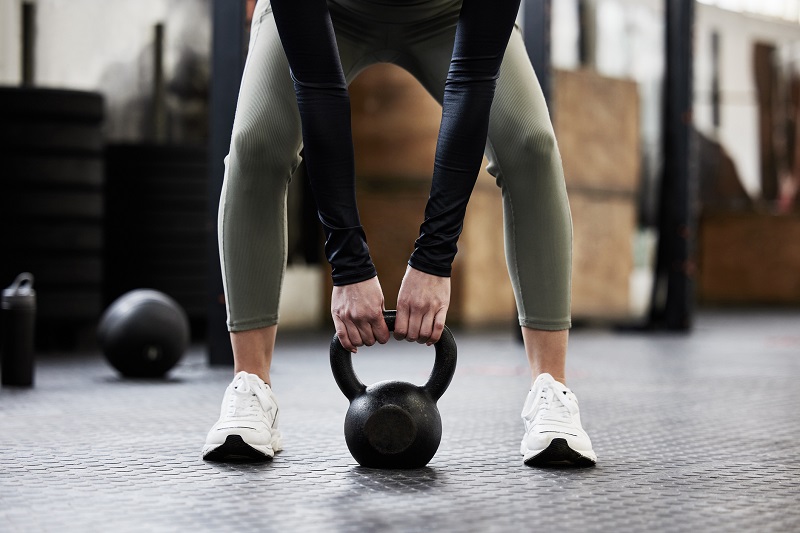Discover the buzz around HIIT, the trendy high-intensity interval training workout! Whether you’ve heard the term from friends, colleagues, or have seen it on your social feed, HIIT has caught the attention of fitness enthusiasts worldwide.
The abbreviation is short for a type of exercise called “high-intensity interval training,” and it’s been one of the trendiest concepts in fitness for nearly a decade. In fact, it was named the seventh exercise trend for 2023 by the American College of Sports Medicine.
It’s important to note that not all interval workouts are considered HIIT, and HIIT may not be suitable for everyone. Keep reading to determine if it should be part of your fitness routine, as we explore more about what it is, what it isn’t, its benefits, and how to assess its compatibility with your fitness goals.
What is HIIT?

High-intensity interval training (HIIT) is defined by the American College of Sports Medicine as a workout that alternates bursts of activity, raising your heart rate to 80-95% of its maximum, with periods of rest, where your heart rate is at 40-50% of its max. If you don’t have a heart rate monitor, aiming for an effort level of 80-95% is like an eight on a perceived effort scale of one to 10. The rest periods should be at a six or lower.
The Benefits of HIIT
HIIT workouts are known for their efficiency, delivering results comparable to longer cardio sessions in less time. By alternating short bursts of high-intensity exercise with periods of easier work or rest, HIIT triggers various benefits like increased calorie burn, fat loss, improved heart health and reduced blood pressure.
Research even shows that overweight or obese individuals who engaged in 12 weeks of HIIT experienced improvements in parameters like blood pressure, fasting glucose, aerobic capacity, waist circumference and resting heart rate.
How Long Should a HIIT Workout Be?

According to the American Council on Exercise (ACE), “When it comes to workout efficiency, HIIT is especially attractive in that it does not require a large amount of time to reap the benefits.” A HIIT workout generally take about 20-30 minutes in total.
The high-intensity efforts can be as short as five seconds, or as long as eight minutes. The bursts and the easier rest periods can be performed using any kind of cardio exercise: Running, cycling, rowing, swimming, calisthenics, lifting weights, swinging a sledgehammer … anything that raises your heart rate into that level. What makes a workout HIIT is alternating a period of high intensity with a period of lower intensity movement or rest … and repeating.
Different Types of HIIT Workouts
This framework can be mixed and matched into all kinds of workouts: One of the best-known is Tabata training, named for the lead scientist on a study from 1996. In this version of HIIT, exercisers perform 20 seconds of all-out effort, then rest for 10 seconds. This pattern—20 seconds on, 10 seconds off—is repeated for four minutes.
In the study, the group that did this kind of HIIT work for six weeks improved their VO2Max—a measure of how much oxygen the body can use—as much as another group that rode for an hour in each session.
There are also one-to-one HIIT efforts, where 30 seconds, one minute, or more hard work is alternated with the same amount of rest. In some protocols, the efforts are really short: In one study, researchers had obese and overweight young women do all-out cycling efforts for eight seconds, then rest for 12 seconds. They did this protocol for 20 minutes in each session. After five weeks, their blood sugar and cardio levels had improved similarly to other participants who did 40-minute sessions.
HIIT can also use distance as a marker instead of time: Many distance runners perform workouts where they run hard for half a lap of a track, then jog or walk the next half.
No matter how HIIT workouts are structured, they should have one thing in common: The hard efforts should be really hard. Performing an effort at 80-95 percent of your maximum heart rate is almost an all-out effort: You should feel like quitting during the effort, and when it’s done, you should be breathless, and unable to speak comfortably.
During the rest period, your breathing should come back under control … just in time to go hard again. When workouts reach these levels of intense effort, they reap some of those magic, time-saving benefits—burning more fat, lowering blood pressure, improving bone density, and increasing heart health in less time than longer, steady-state workouts.
Other Types of Interval Workouts

Because HIIT is so popular and talked about, the term has become shorthand for any interval workout where hard and easy efforts are alternated. But not all interval workouts are HIIT: If the hard efforts don’t reach that breathless, eight out of 10 level, it’s not HIIT. It could be medium-intensity interval training, or MIIT.
That may seem like splitting hairs, but if you’re expecting all of the same time-saving results, it’s significant: When HIIT and MIIT are compared in studies, HIIT workouts often produce greater overall results—improving waist circumference in obese adolescent females, for example, and greater reductions in fat mass in elderly women in another study.
That doesn’t mean HIIT is better than MIIT, though: Medium-intensity interval training, where the “hard” efforts reach a heart rate that’s 55-75 percent of max heart rate, still creates improvements in heart health, fat mass, resting heart rate, body mass and more. And it provides a few unique benefits that HIIT doesn’t—it can be easier to recover from than the all-out efforts of HIIT, and it isn’t as unpleasant to do.
That’s a big deal: HIIT is so hard that you may really dislike doing it. MIIT may be more enjoyable—and thus a more sustainable long-term exercise plan.
Is HIIT right for you?

HIIT’s effective, but it’s not essential for every exerciser. If you’re thinking of trying it—or if you’ve already tried it and aren’t sure if you want to keep doing these types of workouts—ask yourself these three questions.
1. Do I have my doctor’s approval?
Every workout method recommends talking to a doctor before beginning an exercise program … and most people ignore that advice. But with HIIT, it’s serious: Working at such high, intense heart rates is not for everyone. Ask a doctor if performing such high-intensity sessions is safe for you at this time.
2. Do I like it?
The main benefit of HIIT is that it saves time versus other forms of intervals and continuous effort cardio work, but that doesn’t mean the other forms of exercise don’t work. They do—they just take a little longer. But if you hate doing such hard efforts, four minutes of HIIT can feel like 30 minutes of cardio. If you prefer doing 40 minutes of medium-level cardio, or 20 minutes of MIIT, you don’t have to do HIIT. The best workout is one you’ll enjoy and actually perform consistently—so if you hate it, you’re less likely to do so.
3. Am I getting enough cardio work overall?
To maximize the life-extending, disease-fighting benefits of exercise, the Centers for Disease Control and Prevention recommends 150 minutes of moderate-intensity cardio activity per week, 75 minutes of vigorous activity per week, or some combination of both. If you’re doing three or four 10-minute HIIT sessions, you’re working hard…but you’re not hitting those CDC guideline numbers! Those 150- and 75-minute amounts help reduce your risk of cardiovascular disease, diabetes and even early death. So if you’re doing HIIT, mix in some easier work to help you get enough cardio to get all these benefits!
Looking for more fitness tips and workouts? Explore the Fitness section on the Leaf!
The post Unpacking HIIT: The Power-Packed Workout Revolutionizing Fitness appeared first on The Leaf.
from The Leaf https://ift.tt/h75S2VK



